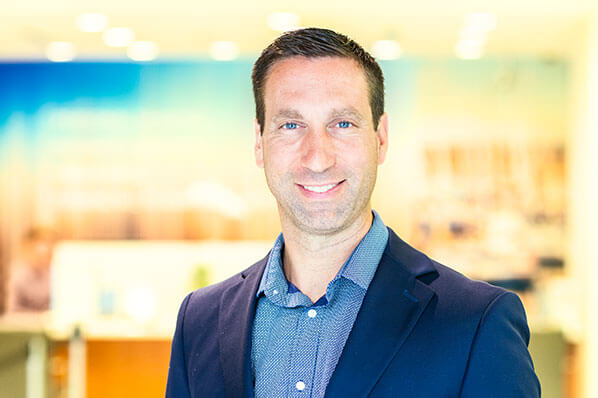REFERRAL PERKS®
For a limited time, earn $200* for you and your friend for every successful referral.
For a limited time, earn $200* for you and your friend for every successful referral.
Learn how an FHSA helps you save for your first home faster.
Learn which savings option is the best for your financial goals.
Explore this step-by-step complete guide to starting a business in British Columbia.
We’ve rounded up 10 of the most common scams — along with ways to identify and outsmart them.

Before moving on to become a Credit Risk Manager with First West Credit Union (Island Savings' parent company), Kyle Douglas was the branch manager at our Westshore Branch. We caught up with Kyle to find out how he personally saves to reach his financial goals.
Pay yourself first. Just like you have rent or mandatory bills, set goals and set up those savings buckets as mandatory payments. Just as your loan or rent payment comes out on your payday, so should your savings.
Each year, I set some goals and set up different accounts with automatic deposits on my paydays. For example, this year I am saving up for a trip to Bali so I have set a budget and have that amount being transferred to a savings labelled ‘Travel’ every two weeks on my payday.
Besides setting up the reoccurring transfers for my savings, I have also looked at any bills that are imperative or easy to forget and have set them up pre-authorized.
I have automatic transfers for the following:
In regards to automating, I tend not to set up a lot of pre-authorized debits due to some of the restrictions on dates from some companies. I always try to align my payments with my pay schedule so if there is a bill payment that I can’t do bi-weekly, I will self-save and pay regularly instead of their pre-authorized debits on dates that don’t align. On top of that, if all possible, I try to find alternatives to writing cheques to shy away from those one offs that you have not left enough money in your account for.
I always check my account on a pay day and the day after all the automatic transfers. I set my goals and budget once per year and regularly review it to make sure on the surface I set a realistic budget and goals. If I have not set a realistic budget, I will take the time to review my actual spending in more detail.
Further Reading: RESP Grants Guide
Here are a few thoughts to address each situation:
Further reading: Benefits Of Your RRSP
Right now I do not have much for term deposits in my savings. I have more aggressive savings in my long-term retirement savings (ie: mutual funds, stocks). That being said, if don’t want to start off your savings in mutual funds, there are some great options from the winwin term to start your long-term savings. Also, if you have money sitting in a TFSA that won’t be used for 2-3 years, a term deposit is most likely the best choice for that investment.
Further reading: Complete Guide To Your TFSA
I got my first job in a credit union when I was 20. My first manager taught me to pay yourself first so I started with a small deposit to my RRSP each paycheque and not budgeting for my bonus but putting that directly into my RRSP as well.
If you have never tried the cash diet for a month, do it. Take one month where you strictly budget out your mandatory costs and then put the rest aside to only use cash or your debit card. This will show you one of two things: either you have set a realistic budget that you can stick to or where you might be spending too much money (Starbucks, eating out, etc.).
You don't have to build your financial plan alone. Our financial advisors have the experience and the expertise to help you create a plan so you can reach your financial goals. Book a financial snapshot and start your tomorrow today.
Everything is easier with a little help.
We acknowledge that we have the privilege of doing business on the traditional territory of First Nations communities.
© First West Credit Union. All rights reserved.
Proudly Canadian